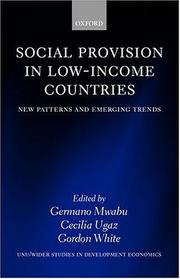| Listing 1 - 10 of 12 | << page >> |
Sort by
|
Book
Abstract | Keywords | Export | Availability | Bookmark
 Loading...
Loading...Choose an application
- Reference Manager
- EndNote
- RefWorks (Direct export to RefWorks)
Book
ISBN: 9789966792464 9966792465 9789966846853 Year: 2010 Publisher: Nairobi, Kenya
Abstract | Keywords | Export | Availability | Bookmark
 Loading...
Loading...Choose an application
- Reference Manager
- EndNote
- RefWorks (Direct export to RefWorks)
Book
ISBN: 996684662X Year: 2009 Publisher: Nairobi University of Nairobi Press
Abstract | Keywords | Export | Availability | Bookmark
 Loading...
Loading...Choose an application
- Reference Manager
- EndNote
- RefWorks (Direct export to RefWorks)

ISBN: 0199242194 Year: 2001 Publisher: Oxford Oxford University Press
Abstract | Keywords | Export | Availability | Bookmark
 Loading...
Loading...Choose an application
- Reference Manager
- EndNote
- RefWorks (Direct export to RefWorks)
Sociology of social care --- Social policy --- Public economics --- Social security law --- Developing countries
Book
Abstract | Keywords | Export | Availability | Bookmark
 Loading...
Loading...Choose an application
- Reference Manager
- EndNote
- RefWorks (Direct export to RefWorks)
Book
Year: 2010 Publisher: Nairobi : Baltimore, Md. : University of Nairobi Press, Project MUSE,
Abstract | Keywords | Export | Availability | Bookmark
 Loading...
Loading...Choose an application
- Reference Manager
- EndNote
- RefWorks (Direct export to RefWorks)
Poverty --- Reproductive health --- Africa --- Economic conditions.
Book
ISBN: 9789966846624 Year: 2009 Publisher: Nairobi University of Nairobi
Abstract | Keywords | Export | Availability | Bookmark
 Loading...
Loading...Choose an application
- Reference Manager
- EndNote
- RefWorks (Direct export to RefWorks)
Book
Abstract | Keywords | Export | Availability | Bookmark
 Loading...
Loading...Choose an application
- Reference Manager
- EndNote
- RefWorks (Direct export to RefWorks)
Book
Year: 2013 Publisher: Washington, D.C., The World Bank,
Abstract | Keywords | Export | Availability | Bookmark
 Loading...
Loading...Choose an application
- Reference Manager
- EndNote
- RefWorks (Direct export to RefWorks)
In 2003 Kenya abolished user fees in all government primary schools. Analysis of household survey data shows this policy contributed to a shift in demand away from free schools, where net enrollment stagnated after 2003, toward fee-charging private schools, where both enrollment and fee levels grew rapidly after 2003. These shifts had mixed distributional consequences. Enrollment by poorer households increased, but segregation between socio-economic groups also increased. The shift in demand toward private schooling was driven by more affluent households who (i) paid higher ex ante fees and thus experienced a larger reduction in school funding, and (ii) appear to have exited public schools partially in reaction to increased enrollment by poorer children.
Education For All --- Macroeconomics and Economic Growth, Education --- Primary Education --- Private Schools --- School Quality --- Secondary Education --- Teaching and Learning --- Tertiary Education --- User Fees
Book
ISBN: 9966792007 Year: 2009 Publisher: Nairobi : University of Nairobi Press,
Abstract | Keywords | Export | Availability | Bookmark
 Loading...
Loading...Choose an application
- Reference Manager
- EndNote
- RefWorks (Direct export to RefWorks)
| Listing 1 - 10 of 12 | << page >> |
Sort by
|

 Search
Search Feedback
Feedback About UniCat
About UniCat  Help
Help News
News